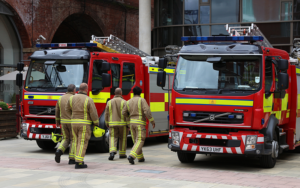
National media reports have revealed that up to a dozen Grenfell firefighters have been diagnosed with terminal cancer.
A news story in the national media last week has said that up to 12 firefighters who helped to tackle the Grenfell Tower blaze in June 2017 have since developed terminal cancer.
The report in the Mirror said that around a dozen firefighters, some aged only in their 40s, are suffering with rare cancers. The majority of these are believed to be incurable digestive cancers and leukaemia, which are being linked to high levels of exposure to carcinogens during the Grenfell rescue effort.
Around 1,300 firefighters were in attendance at Grenfell on the day of the tragedy, many of whom sat in contaminated suits for more than 10 hours, while others were in the tower’s smoke-logged basement for up to six hours.
With some cancers taking decades to appear, the Mirror reported it is feared these first 12 cases could be the early stages of even more Grenfell-linked cancers being diagnosed in firefighters.
WORRYING FINDINGS
This news story comes on the back of recent press releases from the Fire Brigades Union (FBU) that highlight two pieces of research the FBU commissioned from the University of Central Lancashire (UCLan).
The first report – based on a survey of more than 10,000 serving and retired firefighters across the UK, representing almost a quarter of the UK’s total firefighter workforce – has found that toxic contaminants in fires can be directly linked to increased rates of cancer and mental health issues among firefighters.
The report supports last year’s ruling from the International Agency for Research on Cancer, which said that exposure to such contaminants through working as a firefighter is carcinogenic. However, the new research has also gone a step further by highlighting the mental toll that firefighting can take.
The findings, published in the Scientific Reports journal, show that 4.1% of surveyed firefighters were found to have a cancer diagnosis, and instances of cancer among firefighters aged 35-39 is up to 323% higher than in the general population of the same age. UK firefighters who have served at least 15 years are found to be 1.7 times as likely to develop cancer than those who have served less time.
In addition, 20% of respondents reported having a mental health condition. The rate of anxiety among surveyed firefighters was twice that of the general population, while the rate of depression was nearly three times that of the general population.
FURTHER CONCERNS
The second piece of research commissioned by the FBU – where researchers at UCLan studied mortality records from the National Records of Scotland – has found that firefighters’ mortality rates from all cancers is 1.6 times higher than that of the general population.
The research showed the mortality rates for certain types of cancer are significantly higher in firefighters, including:
- Prostate – 3.8 times higher
- Leukaemia – 3.17 times higher
- Oesophageal – 2.42 times higher
In instances where cancer with an unknown origin has spread, the rate was 6.37 times higher than that of the general population.
The same study also revealed that firefighters are dying from heart attacks at five times the rate of the general public, and dying from strokes almost at three times the rate of the general public.
‘LIVES ARE BEING LOST’
Riccardo la Torre, FBU national officer, said: ‘This is about firefighters dying who did not need to. We know that there are clear ways we can make things better for firefighters. We need health surveillance. We need monitoring of exposures. We need legislation that will ensure that affected firefighters are given the compensation they deserve.
‘At the moment we are sorely lacking in all of these areas. It is high time that ends. We cannot lose any more firefighters unnecessarily. Lives are being lost amongst our friends and colleagues and it must stop. We need to catch problems early and mitigate problems early.
‘This is an occupational hazard and no one should get ill, or worse, just for going to work.’
Ruth Wilkinson, head of health and safety at IOSH, added: ‘It is sad to hear that firefighters who risk their lives to save people can suffer such terrible consequences.
‘We know from our No Time to Lose campaign that exposure to carcinogens at work can have a severe life-limiting – and even life-ending – impact. The work of firefighters is incredibly high risk, not just from fires themselves but from many other health and safety hazards including but not limited to being exposed to various dangerous materials, so it is crucial that the necessary steps are taken to protect them.’
To read more about the FBU’s research, visit https://www.fbu.org.uk/news.

